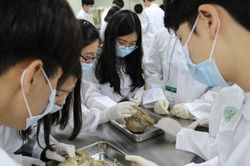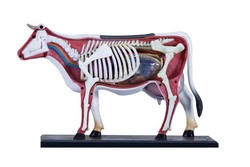
On March 21st, as the Animal Protection Act was enforced in South Korea, animal dissection by minors in anatomy classes was completely banned. Accordingly, a fine will be imposed if a teenager under the age of 19 dissects a living animal or animal carcass. However, the government made exceptions to allow dissection practices by minors in schools if it passes a review by the school's ethics committee. As interest in animal rights has recently grown both at home and abroad, such a system was introduced with the good intention of promoting awareness of animal protection and reducing unnecessary animal experiments. However, there are many pros and cons with this issue when it comes to students' autonomy and learning rights.
Until now, in Korea, animal dissection has been conducted in biology classes during middle and high school curriculum. In addition, private educational institutions have conducted various experiments by minors on animal anatomy of vertebrates. According to the 'Elementary, Middle and High school Biological Experimental Status' published by 17 metropolitan and provincial offices of education, there were 115,325 animals used for anatomy practices by minors from 2012 to 2015. From this fact, it can be judged that animal dissection practices by minors were relatively active and common in Korea before the enactment of the Animal Protection Act.
Then, how do other countries deal with animal dissection by minors in their anatomy classes? First of all, overseas countries are showing a global tendency to reduce animal testing itself to protect animal rights. As a result, the majority of developed countries are naturally moving to reduce or ban animal dissection practice by minors. According to the Agriculture, Food, Rural Affairs, Oceans & Fisheries Committee, the Netherlands, Switzerland, and Poland have banned all animal dissection practice in schools below university. In the United Kingdom, animal anatomy of minors was not legally banned, but the scale was greatly reduced. Currently, only about 3 percent of all schools in the U.K. are found to conduct such experiments. New Zealand is similar to Korea's decision in that it is allowed only when approved by the school's Animal Experiment Ethics Committee for animal anatomy experiment to be required in elementary, middle, and high schools.

Meanwhile, there are countries that consider the choice of minors as a top priority. In the United States, when conducting animal dissection experiments in schools, underage students are guaranteed their rights by allowing them to choose whether to participate in the experiments on their own. However, this is not stipulated by U.S. federal law. In some states, animal anatomy experimentation has been regulated under the state law, named 'Student Choice Laws'. In other cases, there are no laws and regulations, however, the state government or state office of education adopts ‘Student Choice Policies’. Similarly, Italy also grants minors the right to boycott animal testing or anatomy experimentation.
It is clear that animal anatomy experiments are essential and irreplaceable areas considering the specialty of professions related to fields of biology, zoology, and medicine. As a result, many opinions have been raised that animal dissection by minors is necessary to ensure a broad career choice for students. Therefore, society should discuss whether it is educationally necessary for minors to conduct animal dissection in schools by themselves. And then, if necessary, it is important to specifically design the exceptional rules of the Animal Protection Act at which stage of the curriculum, range of animals, and through which procedures to proceed in consideration with the diverse opinions of domestic academics and students.

